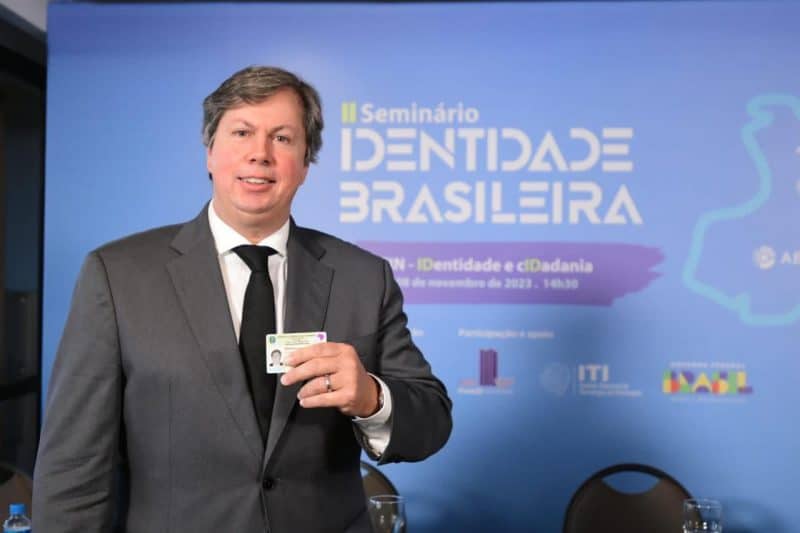ID: You have long argued that Brazil’s Identification System needs to have its own structure, and you have been suggesting that the ITI be part of this. What is your impression about the future of ITI and its responsibilities?
Célio Ribeiro: ITI is already part of this. As of Decree 11,797/23, the ITI received important duties in the context of the CIN System process. But it takes more than that. It was certainly an important advance and what was possible to do at that time. But now, we need to think ahead. Our country has more than 200 million inhabitants, 27 federation units, each with its own reality. Very important social projects that must reach every Brazilian in need. For all of this to work as it should, we need our own, independent structure, with an available budget and sufficient coordination to interact with the units of the Federation, with the ministries and institutions of the three powers involved. Today, at the Digital Government Secretariat, every possible effort is being made to ensure the success of the project. They are unfolding, and with a very small number of people, doing what in many countries is done by hundreds of employees. This is a priority project for the government and is of great importance in social and public security policies. It needs to receive adequate financial and human resources.
Crypto ID: ITI is now under new management. You were in an audience with President Enylson Camolesi, shortly after his inauguration. What is your impression?
Célio Ribeiro: I was very impressed. It was clear to me that he came with a mission to strengthen ITI as an institution. He is an experienced executive, who knows the public and private sectors, having worked in strategic positions in both. At that moment, I realize that he is trying to get to know the terrain better, and, mainly, the actors. He is right. Based on this, I believe that it will seek support for the necessary changes aimed at strengthening ITI, regardless of, say, products, which already has my support.

Crypto ID: What do you mean by that? Products?
Célio Ribeiro: The ITI, in my opinion, will not be limited to the issue of electronic signatures and our ICP-Brazil. The ITI will need to gain muscle to carry out new purposes, such as the Identity Card project itself. In addition, there is an important partnership with gov.br, and this is just part of it. ITI has a highly technical profile and this gives it countless possibilities. And someone in front of you with a good market vision will definitely know how to look for new operating formats. I believe that we will make progress, both in existing businesses, with a necessary change in the business model that I have already advocated, and in new opportunities. But in my view, President Camolesi has a conciliatory profile, and will seek this restructuring in a joint, discussed and planned way. But it also has an executive profile, which means that it will work whatever it takes to achieve its objectives and mission.
Crypto ID: How do you see this new structure in terms of budget needs?
Célio Ribeiro: Of course, this is not simple. This cannot be achieved without planning. At this moment, the government is doing what it can to create the minimum structure necessary to carry out these new tasks. Unfortunately, it was not possible to allocate the necessary resources in the desired way. This work is not simple. It needs to be done in a planned way, worked on from one year to the next. And this is one of the reasons I said previously that it already has my support. This is work that needs to be done by the executive together with the National Congress. At this moment, as InterID, we are the Executive Secretariat of the Mixed Parliamentary Front to Guarantee the Right to Identity (FrenID), and it is part of the Front’s scope of action, as expressly in its Statute, “to monitor the conception and processing of projects relating to identity, digital identity, digital signature, and related topics, as well as budgetary guidelines laws and annual budgets, in order to ensure the allocation of budgetary resources for actions aimed at guaranteeing safeguards for the implementation of a national identity system safe, broad, reliable, digital and that works for the entire population and everywhere in the three spheres of the Federation”, and in this sense, we will work hard.
Crypto ID: You have been working intensely over the last year leading InterID. How has this experience been?
Célio Ribeiro: InterID is something incredible. It has played a very important role in the current scenario in Brazil and the world. When I designed InterID, I was convinced of the importance it would have, but it went beyond what I imagined. We are a non-profit institution with enough activities to be self-sustainable, and this is already a very positive thing, as we do not have any type of counterpart obligation with companies or representative institutions. Our partner associates act as supporters, and bringing all these forces together, we really form something very representative within the identification ecosystem. It is clear that we intend to grow and structure ourselves even more, and that is why we are looking for the best people and institutions so that they can contribute to their work. Institutions and people committed to the cause and that always allow us to work independently towards our statutory objectives.
Crypto ID: This team with you is quite eclectic, how is that going?
Célio Ribeiro: They are people who, like me, have their own tasks and professional commitments, and are available to collaborate with InterID. They are incredible people, who have experience and success in their careers and contribute their time, experience and dedication to the cause of identification through the Institute. I started working when I was 15 years old and, almost 35 years ago, as a lawyer, I began my career where I still work in consultancies in Brazil and abroad. This gave me the conditions to structure and leverage InterID in this first phase. I am very grateful for the trajectory I have had. And this format was like this from the beginning, when I invited two senior people, very experienced and with no business ties at that time, to found InterID. Although they are not part of the Institute’s day-to-day activities, they are always available for good advice.
Crypto ID: What is the role of FrenID in this context? What should we expect from FrenID?
Célio Ribeiro: The Parliamentary Front is a new experience for me. Understanding how the legislature works and being able to collaborate with parliamentarians, in monitoring legislative processes that are related to the issue of identity, is very significant. Currently, we have 200 Federal Deputies and 22 Senators of the Republic, who are under the general coordination of Federal Deputy Flavia Morais and with the sub-coordination of Senator Eliziane Gama, in addition to her Executive Council. The objectives of the Parliamentary Front are well described in its Statute, and I would summarize it with what appears in its Creation Manifesto: “THE MIXED PARLIAMENTARY FRONT TO GUARANTEE THE RIGHT TO IDENTITY will work towards contributing to the Brazilian legislature with initiatives aimed at guaranteeing of the Right to Identity, promoting broad debate and integration with public institutions, the private sector, international organizations, civil society organizations, researchers, as well as affected individuals on issues relating to the topic in a comprehensive manner. Thus, making it possible to recognize demands arising from the modernization of public policies and society’s needs; resolving them through legislative proposals. With the creation of this Parliamentary Front, we hope to contribute to the modernization of the Brazilian Identification System and assist in meeting goal 16.9 of the UN 2030 Agenda, ensuring citizens have universal access to an inclusive, safe, reliable, digital and modern identity.”
Crypto ID: In terms of legislation and regulation, what do you consider most important at this moment?
Célio Ribeiro: Certainly, the work to eradicate sub-identity and, mainly, in initiatives that protect children from birth. We really need to do work that brings protection and citizenship to everyone. Also working on the concept of comprehensive and specific legislation on identification, with attention to the issue of data protection, is very important, as we do not have that today.
Crypto ID: The data collection has been well commented due to the publication of a Letter of Clarification and Repudiation published by you and which was reflected in the mainstream media. What do you have to say about this case that involves the Notary Offices in partnership with a private company and the Dataprev database?
Célio Ribeiro: Absolutely nothing. Since I wrote the aforementioned Letter and officially delivered it to the members of CEFIC and the National Justice Inspectorate, I have not spoken out again. Even though I was contacted by several press channels, I did not give any interviews about it, nor did I comment. Only after an article by a renowned journalist in an important newspaper, I wrote a statement about it, confirming my trust in the people who are in charge of CEFIC and in the CNJ, which irreparably took the initiative to investigate the facts. I just want to correct your question, saying that it involves the Notary’s Offices. This is wrong. It involves an association, ARPEN, which represents a specific segment of the Notary System, which I respect and discuss frequently, given its importance in the Brazilian scenario. In reality, this matter has already been addressed to the competent authorities so that they can verify what is actually happening or planned to happen, and apply the measures they deem necessary. Our duty to communicate something, which seemed contrary to the Identification System in which we have collaborated in these last three decades, was done. Therefore, I apologize for not expressing my opinion on this case specifically, because what I had to say I did officially and here I ratify it. But more broadly, I believe it is very important that this topic of data monetization is quickly discussed and regulated, especially with regard to personal data, which are under the custody of public companies to provide contracted services and which, In principle, they should not be made available to third parties, much less for monetization.
Crypto ID: What is your final message for those who follow the issue of identification in Brazil?
Célio Ribeiro: Of optimism. I am convinced that finally, after decades, we have an excellent Identification System in our country. That we need to focus on positive things, on social and citizen objectives. We must focus energy on creating a great structure capable of making this State project grow and consolidate itself as a great source of Citizenship. And to conclude, I say: CIN, OUR GREATEST INSTRUMENT OF CITIZENSHIP.
Fonte: Crypto ID




